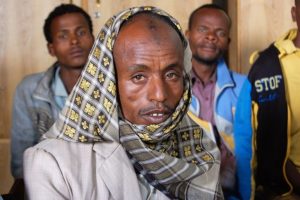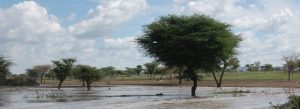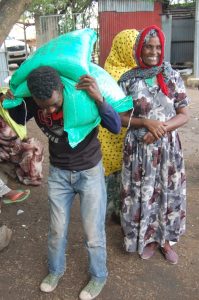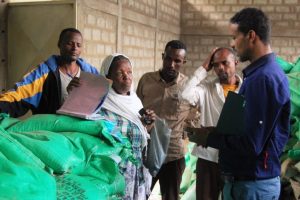
Emergency seed project brings relief to drought-affected farmers in Ethiopia
by Emma Quilligan / July 6, 2016

ADDIS ABABA — As Ethiopia struggles with its worst drought in 50 years, farmers pin their hopes on seed delivered through emergency seed projects.
“The situation last year was so bad that we could only laugh or cry,” said Rameto Tefo, a smallholder farmer from Tsiaroa district in central Ethiopia. “We were highly affected by the drought and we are now reliant on the assistance of the government and organizations such as CIMMYT. Without the seed provided to us from CIMMYT through the emergency seed project, I would have had to beg from my neighbors or just plant grain and hope that it germinated.”
Tefo would have had a difficult time begging for seed from his neighbors; the drought in this district was so severe that most farmers lost all their harvest. Furthermore, the effects of the strongest El Niño on record continued from 2015 into 2016 and the short belg rains that normally fall during March and April were erratic and scarce. By late April, the ground was once again dry and cracked, but the day before we visited Tsiaroa in early May, torrential rain had washed away roads and flooded houses and fields. No one knew whether this was late belg rains, or the start of the main rainy season, which would normally not occur until June.

In this district alone, 67 villages were affected by drought last year and produced little or no harvest. This meant that farmers were unable to save seed for planting this season, and also lacked the income to purchase seed. According to Bekele Abeyo, CIMMYT (International Maize and Wheat Improvement Center) senior wheat breeder/pathologist for sub-Saharan Africa, immediate large-scale support is critical to ensure that the food shortages encountered during 2016 do not balloon into a future crisis for Ethiopia. Abeyo is currently leading the emergency seed project being implemented by CIMMYT in collaboration with the Ethiopian government with support from the U.S. Agency for International Development (USAID). The project’s primary partner, Ethiopia’sAgricultural Transformation Agency (ATA), is supported by a grant from the Bill & Melinda Gates Foundation. Under this project, 50 tons of maize seed are being supplied to Tsiaroa district – enough for each of 4,000 farmers to plant 0.5 ha with improved, drought resistant maize.

“We are optimistic that the high quality maize varieties provided through the emergency seed project will help ensure the future food security of this region,” said Dagne Wegary, CIMMYT maize breeder and maize seed coordinator for the emergency seed project. “Thanks to the long-established network of CIMMYT experts, government development agents, and district focal people, we are able to provide a complete package of improved seed and agronomy advice.”
Nearby Zewai Dugda district was also severely affected by the drought, and now has more than 20,000 farmers in need of emergency seed assistance. CIMMYT is working alongside the government and other organizations to provide seed to 4,400 farmers under the emergency seed project.
It’s a complex logistical task to ensure that the correct farmers receive the right amount of seed, but storekeeper Embete Habesha in Zewai Dugda has everything under control. Farmers may request one of four varieties of drought-tolerant maize (three hybrids and one open-pollinated variety). Habesha is responsible for collecting information and fingerprint signatures from the farmers who receive seed. They are optimistic that – with normal growing conditions – they will be able to achieve yields of up to 4.4 tons/hectare.

Demetu Edao was one of the farmers scheduled to receive seed on the day we visited. She has a 1-ha plot in the village of Ubobracha where she grows teff and wheat, in addition to maize, and she uses the income to pay the school fees for her six children. Edao said she is grateful not only for the seed, but also for the assistance and agronomy advice she receives from government development agents and agriculture experts. Her neighbor and fellow farmer, Boti Decheso, joked that while he looks young, he feels old with the pressure of providing for a wife and two young children. Decheso hopes to use this seed to produce a successful harvest and save some seed for next year, while also ensuring his family has enough to eat. Any surplus maize will be sold so that the family can purchase some livestock and diversify its livelihood as a buffer against future financial and environmental shocks.
Through the emergency seed project implemented by CIMMYT, more than 226,000 households will benefit from the provision of maize, wheat, and sorghum seed. “We hope that this provision of emergency seed will enable Ethiopian smallholder farmers to quickly recover from the devastating drought of 2015,” said Abeyo. “Our unique and strong links with the Ethiopian government, the formal seed sector, farmers’ cooperatives, and partners such as ATA have allowed CIMMYT to quickly respond to farmers’ needs and provide more than 2,700 tons of seed to help ensure Ethiopia’s future food security.”
This article originally appeared on www.cimmyt.org
Africa, CIMMYT, drought tolerance, Ethiopia, Maize, Sub-Saharan Africa
